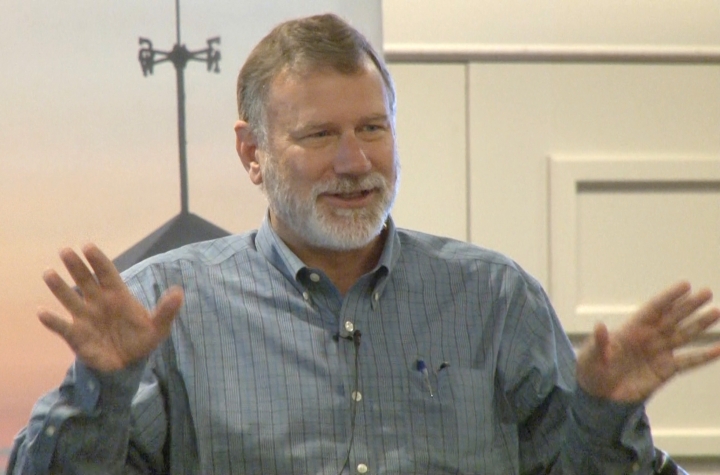news article

Bishop’s Retreat guest speaker: Want vital ministries? Keep your eyes ‘wide open’
October 27, 2015 / By Christian Vischi / .(JavaScript must be enabled to view this email address)
If only that barbecue sauce just had a dash more balsamic vinegar. But you’re not on the committee.
A flood light would make the back parking lot so much safer. But you’re not on the Board of Trustees.
If only the Vacation Bible School program just used a video segment. But you are not on that ministry team.
So you say to yourself, maybe someday I’ll be asked to serve on a committee, and then I can share some of my ideas.
That is one of the faulty assumptions many churches have – that ideas must come from the center. Bishop Robert Schnase, assigned to the Missouri Conference, shared that assumption along with several others from his newest book, “Just Say Yes!: Unleashing People for Ministry,” during the Upper New York Conference’s annual Bishop’s Retreat, held Oct. 20-22 at the Woodcliff Hotel & Spa in Rochester.
It’s erroneous to think that “once you are on the committee that that is the place where Christian ideas must come from,” Bishop Schnase said. Ideas for Sunday school shouldn’t only come from the Christian education committee, and VBS ideas should not start and end with the VBS committee. “It’s a faulty assumption that all ideas must come from a pastor or committees,” he said.
That way of thinking translates to “it is all about us,” he said. But all ideas need to be explored and validated. “The bottom line is this,” Bishop Schnase said, “leaders of growing churches say yes to ministries that declining churches say no to.”
Another road block to ideas gaining traction: traffic cops – proverbially speaking, that is.
If you have heard the phrase “that will never work here,” you have probably heard it from a “traffic cop.” If the idea must pass through that person, then you definitely know one.
“Every church has one or two people that are like the traffic cops, who just demand that everything must receive their personal approval,” Bishop Schnase said, and this includes pastors.
To counter the faulty assumption that all ideas must first be shared with the reigning church elders, he suggests that all church members go into a proposal – whether it’s for missions, ministry, or even a minor local church project, such as planting a tree – with “eyes wide open.”
“These behaviors are built on a faculty assumption that this is our church. To whom does the church belong? It does not belong to the trustees or even the members of the congregation, or even (the Conference through) the trust clause,” Bishop Schnase said. “It belongs to Jesus Christ.”
The question that must always be asked is: “How does this serve the purposes of Christ?”
But faulty assumptions are not always easy to let go. Take that minor local church project mentioned above. Years ago, when Bishop Schnase was serving at a local church, a member of the congregation volunteered to replace a dead tree in front of the church property. In fact, it had been dead for “quite some time,” as Bishop Schnase recalled. But it didn’t get replaced because it had been given to the church in memory of someone. Bishop’s Retreat attendees nodded in understanding at those words.
Then Bishop Schnase offered his take on it: Why not replace the tree? “It’s dead,” he said, receiving laughter, “and so is he,” referring to whom the tree represents.
Another way to kill an idea: Death by complexity – the Church with a thousand steps. “People just get exasperated by it,” Bishop Schnase said. There could be a great idea for a noon-time basketball program, but then the church asks for the minutiae of the league – from what water bottles the players will use to how they will verify fouls called – killing the idea before it can come to fruition.
In that same vein is a church that has all the details but talks them to death. Instead of picking a color to paint a nursery and beginning the project, they talk about it, “and they talk about it, and they do it again and again. Their anxiety goes up when the decision is made instead of going down,” Bishop Schnase said. To keep that anxiety at bay – a fear of making the wrong decision and angering someone in the church – they choose to bog down the decision-making process with endless questions and discussion about every possible outcome, including outcomes that have only the slimmest of possibilities of coming true: think reductio ad absurdum.
Don’t misunderstand, there is a time when “no” is the right answer, such as when people try to dump something on the church. Volumes and volumes of an encyclopedia series from the 1950s may be free from the donor, but the church could be on the hook for a disposal cost. A business inundated by flood waters may temporarily store their salvaged merchandise in a little-used room at the church, but 24 months later, the business should probably not still be occupying that space, nor without just compensation to the church.
But if churches want their missions and ministries to grow and flourish, Bishop Schnase says they should embrace the mission statement drafted more than 20 years ago by the Rev. James R. Downing, Jr., senior pastor at the First United Methodist Church of Sedalia in the Missouri Conference’s Heartland District.
Bishop Schnase’s book title somewhat mirrors Rev. Downing’s statement: “Say Yes to life, to love, to God.”